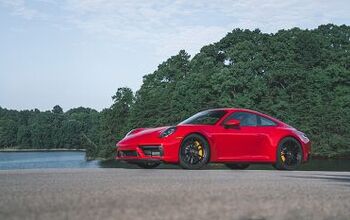Toyota Wants To Make EVs For (And Later In) China

Despite the worse than lackluster uptake of EVs in China, and disappointing sales of hybrids in the Middle Kingdom, companies and the government are still convinced that electric cars are the wave of the future. Toyota will join the fray and will introduce an electric vehicle in China, Vice Chairman Katsuaki Watanabe told The Nikkei [sub]. While announcing that Toyota will enter the electric vehicle market in 2012, Watanabe said, “we’re favorably considering a move into China as well.” It’s not that the market is screaming for plug-ins, or even hybrids.
Toyota introduced their Prius in China in 2005, but sold only around 300 last year. According to the Nikkei, Toyota “will incorporate local consumer preferences into the electric and plug-in models in an effort to boost its Chinese sales of green cars.” Local consumer preferences are indeed a problem: They don’t want the new energy cars. BYD’s sales of pure plugins are non-existent, their hybrid sales are a disaster. BYD’s best selling car, the F3, runs on pump gas.
Toyota will initially export EVs from Japan to China (which will make them even more expensive) and will focus “on those cities possessing infrastructure for recharging the vehicles.” And those are? Later, they want to produce EVs locally.
Sales for a plug-in hybrid based on the Prius will begin on a trial basis in China this year, mainly targeting local governments and companies. Good luck with that also. Japan is not in China’s best graces after a Chinese ship rammed a Japanese coast guard cutter (or vice versa) and after the Chinese captain was arrested.
China will spend $14b through 2020 to promote cars that run on fuels other than gasoline. But the Chinese government has made it pretty clear that the money will go to cars made in China. Even with lavish subsidies, the Chinese ignored new energy cars so far and prefer good old gasoline.

Bertel Schmitt comes back to journalism after taking a 35 year break in advertising and marketing. He ran and owned advertising agencies in Duesseldorf, Germany, and New York City. Volkswagen A.G. was Bertel's most important corporate account. Schmitt's advertising and marketing career touched many corners of the industry with a special focus on automotive products and services. Since 2004, he lives in Japan and China with his wife <a href="http://www.tomokoandbertel.com"> Tomoko </a>. Bertel Schmitt is a founding board member of the <a href="http://www.offshoresuperseries.com"> Offshore Super Series </a>, an American offshore powerboat racing organization. He is co-owner of the racing team Typhoon.
More by Bertel Schmitt
Latest Car Reviews
Read moreLatest Product Reviews
Read moreRecent Comments
- Redapple2 Love the wheels
- Redapple2 Good luck to them. They used to make great cars. 510. 240Z, Sentra SE-R. Maxima. Frontier.
- Joe65688619 Under Ghosn they went through the same short-term bottom-line thinking that GM did in the 80s/90s, and they have not recovered say, to their heyday in the 50s and 60s in terms of market share and innovation. Poor design decisions (a CVT in their front-wheel drive "4-Door Sports Car", model overlap in a poorly performing segment (they never needed the Altima AND the Maxima...what they needed was one vehicle with different drivetrain, including hybrid, to compete with the Accord/Camry, and decontenting their vehicles: My 2012 QX56 (I know, not a Nissan, but the same holds for the Armada) had power rear windows in the cargo area that could vent, a glass hatch on the back door that could be opened separate from the whole liftgate (in such a tall vehicle, kinda essential if you have it in a garage and want to load the trunk without having to open the garage door to make room for the lift gate), a nice driver's side folding armrest, and a few other quality-of-life details absent from my 2018 QX80. In a competitive market this attention to detai is can be the differentiator that sell cars. Now they are caught in the middle of the market, competing more with Hyundai and Kia and selling discounted vehicles near the same price points, but losing money on them. They invested also invested a lot in niche platforms. The Leaf was one of the first full EVs, but never really evolved. They misjudged the market - luxury EVs are selling, small budget models not so much. Variable compression engines offering little in terms of real-world power or tech, let a lot of complexity that is leading to higher failure rates. Aside from the Z and GT-R (low volume models), not much forced induction (whether your a fan or not, look at what Honda did with the CR-V and Acura RDX - same chassis, slap a turbo on it, make it nicer inside, and now you can sell it as a semi-premium brand with higher markup). That said, I do believe they retain the technical and engineering capability to do far better. About time management realized they need to make smarter investments and understand their markets better.
- Kwik_Shift_Pro4X Off-road fluff on vehicles that should not be off road needs to die.
- Kwik_Shift_Pro4X Saw this posted on social media; “Just bought a 2023 Tundra with the 14" screen. Let my son borrow it for the afternoon, he connected his phone to listen to his iTunes.The next day my insurance company raised my rates and added my son to my policy. The email said that a private company showed that my son drove the vehicle. He already had his own vehicle that he was insuring.My insurance company demanded he give all his insurance info and some private info for proof. He declined for privacy reasons and my insurance cancelled my policy.These new vehicles with their tech are on condition that we give up our privacy to enter their world. It's not worth it people.”

































Comments
Join the conversation